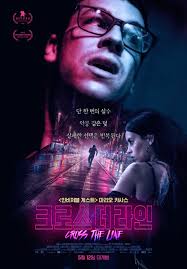
CROSS THE LINE
Spain, 2020, 92 minutes, Colour.
Mario Casas, Milena Smit, Elizabeth Lorena, Fernando Valdiveilso.
Directed by David Victori.
Dani, played by popular Spanish actor, Mario Casas, is a timid man, has been looking after his sick father, then coping with his father’s death, supported by his enterprising sister, Laura. While wanting to go back to work, he is challenge by Laura who buys him a round the world ticket to get him out of himself and his past life.
Most of the action of the film takes place over a couple of hours. The camera technique is to urge audiences to be close to Dani, many close-ups of his face, and generally, the camera tracking after Dani throughout the streets, or moving with him and facing him.
Dani is a kind man and helps out a young woman who has no money on her for b to payurgers. She states she is indebted to him, continues to cajole him, he succumbing every time, going her to her tattoo shop, reluctantly accepting a tattoo, a photo of them for the wall, then persuaded to go to her apartment, her sexual advances, the return of her boyfriend, a desperate fight, Dani killing the man, the woman leaping out the window.
Dani then has to make moral decisions, wants to go to the police, his sister urging him not to, so he returns to the tattoo shop to retrieve the incriminating photo, otherwise there is no evidence against him, cash payments. What follows are more fights, his being brutalised, the pressure on his conscience.
The film does not end with a pat solution but, rather, the young woman in coma, the possibility of her recovering and going to the police, and a long final shot, Dani looking into the mirror, questioning himself, and his looking at the camera lens and therefore at the audience, challenging us to make our moral decision.
- The title, the moral line, looked, responsibility, choice?
- The Barcelona settings, hospital, apartments, offices, the streets, the bar, the tattoo shop, upstairs, atmospheric? The musical score?
- The camera style, continuing on the move, close-ups of Dani, the camera following him right throughout the film, the sense of movement?
- Dani, devoted to his father, buying the cigarettes, the father’s death, the meeting with Laura, the sadness, going back to work, his timidity, Laura buying him the air ticket? Urging him to make more of his life?
- The action over a few hours, Dani and the bar, Mila and her approach, paying for the burgers, her spiel, his paying, her pressurising him, his genial nature, succumbing to her, her cajoling, going to the tattooe store, persuading him to have the tattoo?
- The photo, on the wall, leaving, going to the apartment, the drinking, her pressure, sexual response, Ray at the door, his entry, Dani hiding, the confrontation, the fight, desperate, Dani killing Ray? Miller and her reaction, jumping out the window?
- Dani, the physical impact, psychological impact, contacting Laura, telling her the story, her covering for him? His trying to recover, the return to the tattoo shop, recovering the photo, the owners coming in, his hiding, the bashing, his getting out, in the streets, the fights?
- Contacting Laura, the news about Mila in coma? The possibility of her recovery and speaking to the police?
- The moral dilemma for Dani, his wanting to go to the police, Laura not wanting to go, his conscience, Mila and her waking up from the coma, possible denunciation, his going to the hospital?
- The long final shot, Dani looking into the camera, looking at himself, looking at the audience, challenging the audience to make their own moral decision?